Posts by Christopher Lochhead
381 Chicken Cock Whiskey & The King: Matti Anttila on the Art of Brand Revival and Celebrity Partnerships
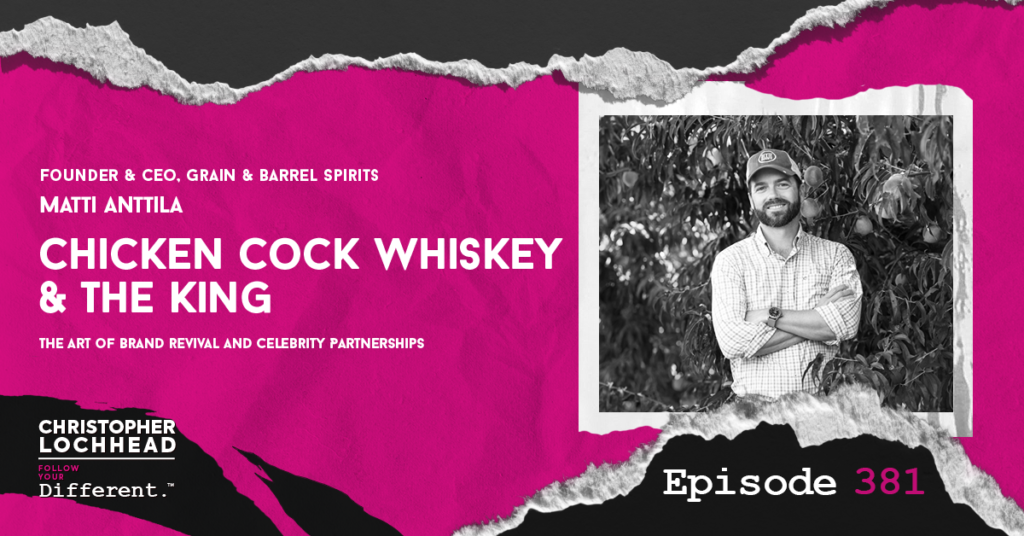
Podcast: Play in new window | Download (Duration: 1:20:35 — 55.3MB) | Embed
Subscribe: Apple Podcasts | Spotify | Pandora | RSS | More
On this episode of Christopher Lochhead: Follow Your Different, we have a conversation with Matti Anttila, the visionary founder of Grain and Barrel Spirits.
Matti shares his remarkable journey from investment banking to becoming a leader in the craft spirits market, focusing on the revitalization of the iconic Chicken Cock whiskey brand. He discusses the importance of brand authenticity, leveraging history, and the unique identity of Chicken Cock.
The episode also explores Matti’s collaboration with the Elvis Presley estate, enhancing the brand’s allure. Matti emphasizes experiential engagement and strategic partnerships to differentiate in a competitive market, offering valuable insights for entrepreneurs in the spirits industry.
You’re listening to Christopher Lochhead: Follow Your Different. We are the real dialogue podcast for people with a different mind. So get your mind in a different place, and hey ho, let’s go.
Matti Anttila: From Investment Banking to Craft Spirits
Matti’s transition from a lucrative career in investment banking to the unpredictable world of spirits was driven by a desire to create something meaningful. His background in real estate development fueled his passion for building something from the ground up, allowing him to see his ideas come to life.
Transitioning to a new industry can be daunting, but pursuing what he loves has led to greater fulfillment and success. By utilizing his previous experiences and skills, Matti was able to build a strong foundation in his new venture.
Differentiating in a Competitive Market: Identifying White Space & Leveraging History
Matti emphasizes that true innovation often comes from outside the industry. When entering the spirits market, he sought to identify “white space” within established categories, allowing him to avoid the challenge of educating consumers about what whiskey or bourbon is. This approach enabled him to carve out a unique niche for Chicken Cock whiskey.
Another significant part of Matti’s strategy involved leveraging history. He recognized that whiskey is a category where history plays a crucial role. By resurrecting Chicken Cock, a brand with roots dating back to 1856, he tapped into a rich heritage that added depth to the brand’s narrative.
Matti Anttila & The Power of a Distinctive Name
The name “Chicken Cock” itself was a major draw for Matti. It not only piqued his curiosity but also served as an effective conversation starter. The brand’s history, including its prominence at the Cotton Club during prohibition and mentions by figures like Duke Ellington, added to its allure.
Matti believes that word-of-mouth marketing is one of the most powerful tools for any brand. Chicken Cock’s distinctive name naturally fosters conversations, making it easier to engage consumers and build brand awareness.
To hear more from Matti Anttila and his thoughts on how to revive a brand to something legendary, download and listen to this episode.
Bio
Matti Anttila is the founder & CEO of Grain & Barrel Spirits, an innovative company specializing in crafting and marketing premium spirits.
With a passion for authenticity and quality, Matti has revived historic brands and introduced new, award-winning products like Chicken Cock Whiskey, Dixie Vodka, and Endless Summer Spirits.
His approach combines an appreciation for tradition with a modern, entrepreneurial spirit, leading Grain & Barrel to rapid growth in the global spirits industry.
Matti’s leadership and dedication to brand authenticity have made Grain & Barrel Spirits a standout in the market, recognized for its distinctive, high-quality offerings.
Links
Follow Matti Anttila!
Website | LinkedIn | Interview with Matti
We hope you enjoyed this episode of Christopher Lochhead: Follow Your Different™! Christopher loves hearing from his listeners. Feel free to email him, connect on Facebook, Twitter, Instagram, and subscribe on iTunes!
206 The One-Sentence Strategy | Pirate Jam
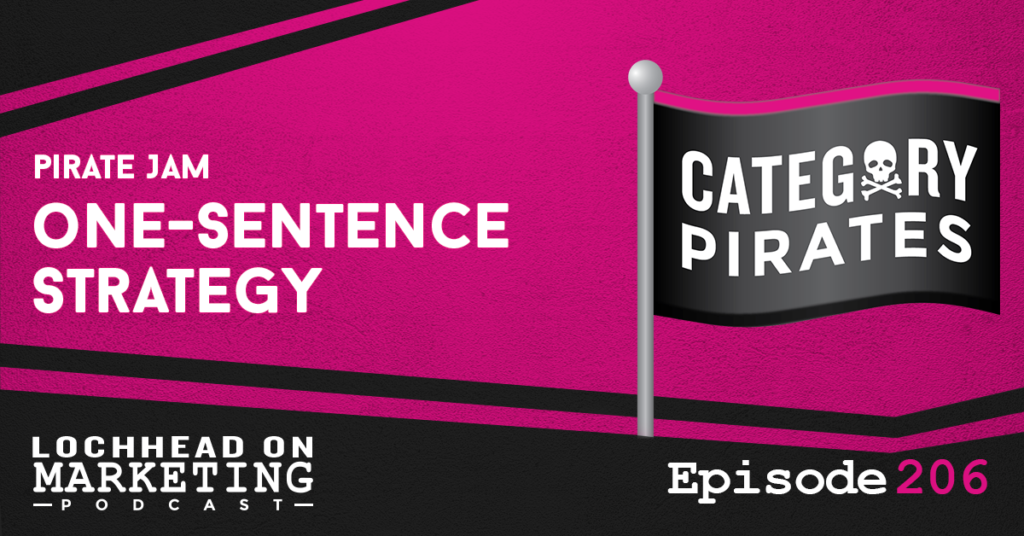
Podcast (lochheadonmarketing): Play in new window | Download (Duration: 10:15 — 7.0MB) | Embed
Subscribe: Apple Podcasts | Spotify | RSS | More
On this episode of Lochhead on Marketing, Category Pirates Christopher Lochhead and Eddie Yoon talk about the power of simplifying business strategies into a One-Sentence Strategy.
They discuss how successful companies, from large enterprises to solopreneurs, leverage concise strategies to drive focus and alignment. Highlighting examples like Gillette’s “revenue per user per year” and Microsoft’s “a computer on every desktop,” they emphasize the importance of clarity and customer-centric approaches.
The episode underscores that while crafting a one-sentence strategy is challenging, it is essential for achieving cohesive company culture and long-term success.
Welcome to Lochhead on Marketing. The number one charting marketing podcast for marketers, category designers, and entrepreneurs with a different mind.
The Power of Having One Clear Strategy
Eddie Yoon emphasizes that the most successful businesses, regardless of their size, often operate under a singular, clear metric or strategy. This simplicity allows for better focus and alignment across the organization. He cites the example of Gillette, which used “revenue per user per year” (RUPI) and “profit per user per year” (PUPI) as their guiding metrics. This approach not only streamlined their decision-making but also ensured that all team members understood their primary objectives.
Christopher & Eddie then give examples of several legendary companies that have thrived due to their clear, concise strategies. For instance, Microsoft’s one-sentence strategy was “a computer on every desktop,” which guided their product development and marketing efforts for decades. Similarly, YETI, known for its premium ice coolers, positioned itself with the straightforward strategy of offering a “premium ice cooler,” differentiating itself from traditional, lower-cost options.
The Importance of Customer Focus
They also point out how these companies maintain a customer-centric approach. For example, the Keurig coffee system was built around the idea of convenience and choice, with the metric of “K-cups per brewer per day” driving their business decisions. This focus on customer experience and satisfaction is crucial for long-term success.
Christopher explains that while these strategies are simple to understand, executing them effectively is often challenging. He notes that when a company has a clear strategy, it becomes easier to align employees, investors, and customers towards a common goal. This alignment is essential for fostering a cohesive company culture and driving growth.
The Challenge of Crafting a One-Sentence Strategy
Creating a one-sentence strategy is not a straightforward task. It requires deep reflection and a thorough understanding of the business’s core mission and values.
Christopher & Eddie discuss how many organizations settle for vague or overly complex strategies, which can lead to confusion and misalignment. They advocate for a rigorous process of distillation, where businesses must sift through their ideas and focus on what truly matters.
One of the standout examples is the Ritz-Carlton’s guiding principle: “Ladies and gentlemen serving ladies and gentlemen.” This simple yet profound statement encapsulates their commitment to exceptional service and sets a high standard for their employees. It illustrates how a well-crafted strategy can inspire and elevate a brand’s identity.
To hear more From Christopher & Eddie about the One-Sentence Strategy, download and listen to this episode.
Want to hear more Pirate Jams? Head on over to Category Pirates and enjoy more conversations between Category Pirates Christopher & Eddie!
Don’t forget to grab a copy (or gift!) of one of our best-selling books:
Snow Leopard: How Legendary Writers Create A Category Of One
The Category Design Toolkit: Beyond Marketing: 15 Frameworks For Creating & Dominating Your Niche
A Marketer’s Guide To Category Design: How To Escape The “Better” Trap, Dam The Demand, And Launch A Lightning Strike Strategy
 The 22 Laws of Category Design: Name & Claim Your Niche, Share Your POV, And Move The World From Where It Is To Somewhere Different
The 22 Laws of Category Design: Name & Claim Your Niche, Share Your POV, And Move The World From Where It Is To Somewhere Different**NEW!** The B2B Tech Marketer’s Guide To Category Design: How To Engineer Your Market, Find What Makes You Different, And Become A Category Queen
We hope you enjoyed this episode of Lochhead on Marketing™! Christopher loves hearing from his listeners. Feel free to email him, connect on Facebook, X (formerly Twitter), Instagram, and subscribe on iTunes and Spotify!
379 Breaking the Cycle of Competition: Seth Godin on Winning Your Own Game
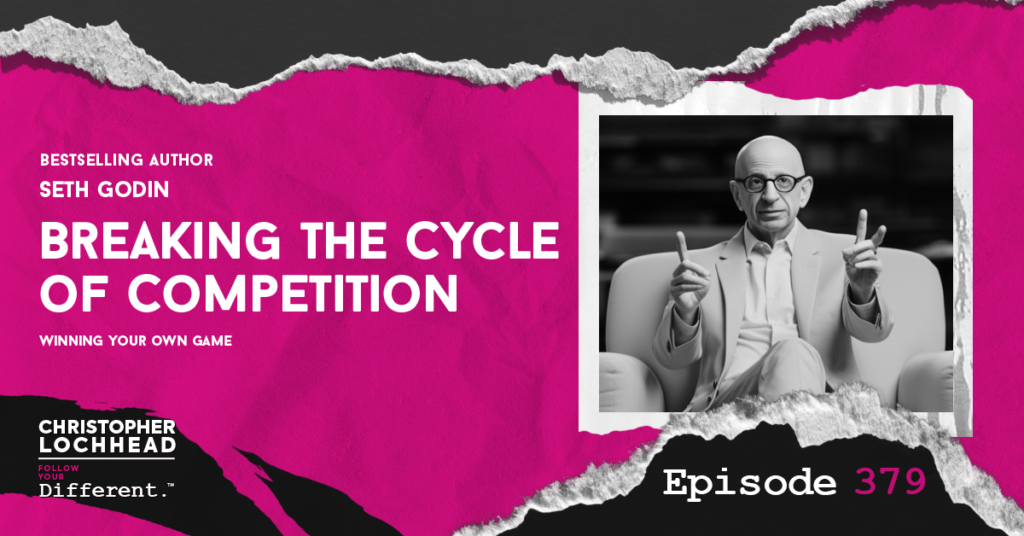
Podcast: Play in new window | Download (Duration: 54:28 — 37.4MB) | Embed
Subscribe: Apple Podcasts | Spotify | Pandora | RSS | More
On this episode of Christopher Lochhead: Follow Your Different, we engage with marketing innovator and bestselling author Seth Godin.
We explore the transformative impact of AI on business, the significance of personal agency, and the pitfalls of hustle culture. Seth emphasizes the importance of choosing customers and competition wisely, as these decisions shape one’s future. The conversation also highlights the role of emotional labor, the need for intentionality in life and career design, and the dangers of hustle culture.
Seth advocates for permission-based marketing, urging marketers to build genuine connections and deliver value to their audiences.
You’re listening to Christopher Lochhead: Follow Your Different. We are the real dialogue podcast for people with a different mind. So get your mind in a different place, and hey ho, let’s go.
Seth Godin on the Importance Personal Agency
Seth Godin emphasizes the importance of taking control of one’s life and career. He argues that many people are conditioned to conform and fit in, which limits their potential. Instead, he advocates for a life designed with intention, where individuals actively choose their paths rather than passively responding to circumstances.
Another central idea in Seth’s philosophy is that the customers and competition one chooses directly influence their future. He explains that if you cater to a specific audience, you must accept the limitations that come with that choice. Conversely, by selecting customers who align with your vision, you can create a more fulfilling and successful career.
The Impact of AI on Business
The conversation also explores the impact of AI on the business landscape. Seth discusses how AI can be leveraged not just as a tool but as an integral part of a business strategy. He emphasizes that while AI can automate certain tasks, the human element—emotional labor, creativity, and decision-making—remains irreplaceable.
Seth Godin’s thoughts on Hustle Culture
Seth critiques the hustle culture that glorifies constant work and competition. He argues that this mindset can lead to burnout and dissatisfaction. Instead, he encourages individuals to focus on meaningful work that aligns with their values and goals, rather than chasing trends or external validation.
Seth and Christopher then discuss the idea that collaboration can oftentimes lead to greater success than competition. They argue that viewing others in the same field as collaborators rather than competitors can foster a more supportive and innovative environment.
To hear more from Seth Godin and his thoughts in AI & Hustle Culture, download and listen to this episode.
Bio
Seth Godin is a renowned entrepreneur, author, and marketing thought leader. He is the creator of the blog “Seth’s Blog,” where he shares insights on marketing, leadership, and personal development.
Godin has written over 20 bestselling books, including Purple Cow, Linchpin, and The Dip, which focus on innovation, branding, and standing out in today’s competitive market.
He is also the founder of several startups, including Yoyodyne, which pioneered online permission marketing.
Through his writing, speaking, and courses, Godin encourages individuals to embrace creativity and make meaningful contributions.
Links
Follow Seth Godin!
Seth’s Blog | Website | LinkedIn
We hope you enjoyed this episode of Christopher Lochhead: Follow Your Different™! Christopher loves hearing from his listeners. Feel free to email him, connect on Facebook, Twitter, Instagram, and subscribe on iTunes!
378 From Combat to Competition: How Command Sergeant Major Gretchen Evans Redefined Resilience
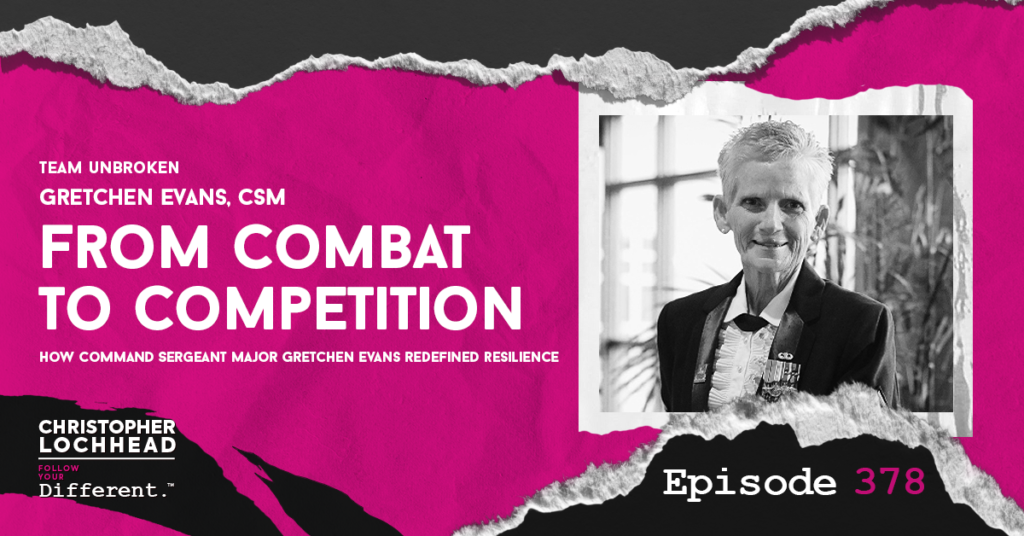
Podcast: Play in new window | Download (Duration: 1:36:24 — 44.1MB) | Embed
Subscribe: Apple Podcasts | Spotify | Pandora | RSS | More
On this episode of Christopher Lochhead: Follow Your Different, we engage in a profound conversation with Command Sergeant Major Gretchen Evans, a decorated veteran who served 27 years in the U.S. Army.
Gretchen shares her inspiring journey, from her motivations for joining the military to her experiences as one of the few women in a male-dominated environment. She discusses the challenges she faced, including injuries that led to her hearing loss, and her post-military work with Team Unbroken, an adaptive athletic team she founded.
Gretchen Evans’ story is one of resilience, leadership, and unwavering dedication to service.
You’re listening to Christopher Lochhead: Follow Your Different. We are the real dialogue podcast for people with a different mind. So get your mind in a different place, and hey ho, let’s go.
Honoring Veterans and Their Service: Command Sergeant Major Gretchen Evans
Christopher opens the episode by expressing his deep respect for veterans and the critical role they play in society. He then introduces Command Sergeant Major Gretchen Evans, highlighting her remarkable journey and the challenges she faced, including injuries sustained in combat that led to her hearing loss.
Christopher emphasizes Gretchen’s role as an inspiration, both during her military career and in her life after service, particularly through her work with Team Unbroken, an adaptive athletic team for veterans and civilians who have faced life-altering injuries or trauma.
Early Motivations and Joining the Military
Gretchen shares her motivations for joining the military, which were born out of necessity. After losing her parents at a young age, her older brother became her guardian. Struggling to make ends meet while juggling college and work, she was inspired by her father, a World War II veteran, and the values instilled in her.
She decided to enlist in the military, finding a welcoming environment in the Army after being turned away by other branches due to her height.
Breaking Barriers as a Woman in the Military
When Gretchen Evans enlisted in 1979, there were very few women in combat roles. She reflects on the challenges of being one of the few women in a male-dominated environment, particularly during basic training.
Despite the tough leadership from Vietnam veterans who were not accustomed to training women, Evans expresses gratitude for the rigorous training she received, which prepared her for the realities of military life.
She shares her first experience of being deployed to a combat zone in Grenada in 1983, describing the mix of nerves and excitement she felt. Despite her youth and inexperience, she relied on her training and the guidance of her leaders to navigate the chaotic environment.
To hear more from Gretchen Evans and her inspiring story of never giving up, download and listen to this episode.
Bio
Command Sergeant Major Gretchen Evans is a highly decorated U.S. Army veteran, motivational speaker, and author.
With over 27 years of service, she served as a senior intelligence analyst and paratrooper in multiple combat zones, including Afghanistan, where a mortar blast resulted in a traumatic brain injury and hearing loss.
Despite her injury, Evans continues to inspire through her resilience, sharing her journey in overcoming adversity. She leads Team UNBROKEN, the first all-disabled team in the “World’s Toughest Race” on Amazon Prime, promoting awareness about disability and perseverance.
Links
Follow Command Sergeant Major Gretchen Evans!
Team UNBROKEN | LinkedIn | Instagram
We hope you enjoyed this episode of Christopher Lochhead: Follow Your Different™! Christopher loves hearing from his listeners. Feel free to email him, connect on Facebook, Twitter, Instagram, and subscribe on iTunes!
376 Drunk: How We Sipped, Danced, and Stumbled Our Way to Civilization with Professor Edward Slingerland, Distinguished Scholar and Professor of Philosophy UBC
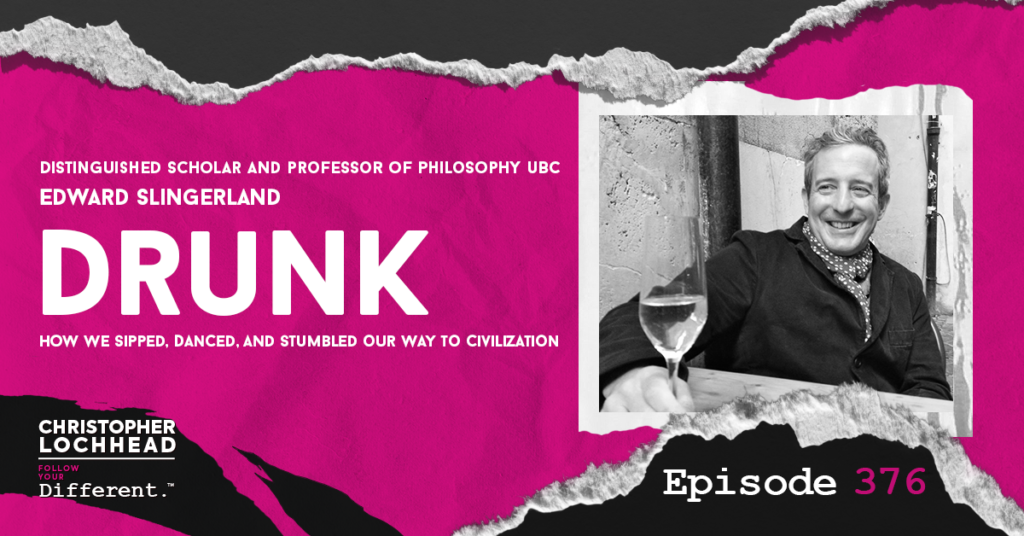
Podcast: Play in new window | Download (Duration: 1:21:34 — 56.0MB) | Embed
Subscribe: Apple Podcasts | Spotify | Pandora | RSS | More
In the spirit of Oktoberfest, this episode of the Christopher Lochhead: Follow Your Different is a look back into our conversation with Professor Edward Slingerland, a distinguished scholar and author of Drunk: How We Sipped, Danced, and Stumbled Our Way into Civilization.
They delve into the cultural and historical significance of alcohol consumption, examining its role in human civilization. Professor Slingerland argues that alcohol has been pivotal in social bonding, creativity, and even the development of agriculture. They discuss how different cultures approach drinking, highlighting the benefits of moderation and the potential harms of excessive consumption. The episode offers a nuanced perspective on alcohol’s impact on society.
You’re listening to Christopher Lochhead: Follow Your Different. We are the real dialogue podcast for people with a different mind. So get your mind in a different place, and hey ho, let’s go.
Edward Slingerland on Why Humans Enjoy Getting Drunk
Professor Slingerland begins by addressing a fundamental question: why do humans enjoy getting drunk? The simple answer is that it feels good. However, this leads to a deeper inquiry: why has evolution allowed us to enjoy getting drunk? The prevailing narrative suggests that our attraction to intoxication is an evolutionary mistake. Substances like alcohol are often seen as hijacking our brain’s reward circuits, providing pleasure without any evolutionary purpose.
Contrary to this view, Professor Slingerland argues that alcohol has played a significant role in human evolution. Unlike other pleasurable activities that evolution tolerates because they are not overly costly, alcohol consumption can cause real harm.
But despite its potential dangers, humans have been focused on making and consuming alcohol for thousands of years. Archaeological evidence shows that humans were brewing beer around 13,000 years ago, well before the advent of agriculture. This suggests that our desire to get intoxicated may have driven the development of agricultural societies.
Alcohol and the Development of Societies
One of the key arguments in Professor Slingerland’s book is that the first plants domesticated by humans were often those with psychoactive properties, not necessarily those that were nutritionally beneficial. For instance, the ancestor of maize was cultivated for its potential to make beer rather than for food. This desire for intoxication may have been a primary motivator for settling down and forming agricultural societies.
Once humans transitioned to agricultural societies, they faced new challenges. Life in these communities was often stressful and monotonous compared to the more egalitarian and diverse lifestyles of hunter-gatherers. Alcohol provided a means to cope with these stresses, enhancing mood and reducing anxiety. This is still true today; many people enjoy a drink after work to mark the transition from a stressful day to a more relaxed evening.
Alcohol and Creativity
Alcohol has a long history of being used to enhance creativity. Humans rely heavily on creativity for survival, especially in adapting to changing environments and competing with other groups. However, there’s a tension in our brains between the need to innovate and the need to focus. Alcohol can help loosen inhibitions and foster creativity by temporarily downregulating the prefrontal cortex (PFC), which is responsible for executive functions like focus, impulse control, and decision-making.
The famous saying “write drunk, edit sober” encapsulates this dynamic. Different psychoactive substances can enhance different cognitive functions. Alcohol can help loosen inhibitions and foster creativity, while stimulants like caffeine can improve focus and task management. This balance between creativity and focus is crucial for innovation and problem-solving.
To hear more from Professor Edward Slingerland and the culture of drinking through the ages, download and listen to this episode.
Bio
Professor Edward Slingerland is a Distinguished University Scholar at the University of British Columbia, specializing in early Chinese thought, cognitive science, and digital humanities.
Educated at Princeton, Stanford, and UC Berkeley, he has authored major works, including Trying Not to Try and Drunk, exploring the intersections of ancient philosophy and modern science.
He directs the Database of Religious History and has received over $11 million in grants for interdisciplinary projects. Slingerland is also a dual citizen, avid ocean kayaker, and educator through his popular MOOCs on Chinese thought and religion.
Links
Website | UBC Profile | Twitter | Drunk
We hope you enjoyed this episode of Christopher Lochhead: Follow Your Different™! Christopher loves hearing from his listeners. Feel free to email him, connect on Facebook, X (formerly Twitter), Instagram, and subscribe on Apple Podcast / Spotify!
375 Rambling Redefined: Category Design and the Janus Motorcycle Revolution with Richard Worsham & Grant Longenbaugh
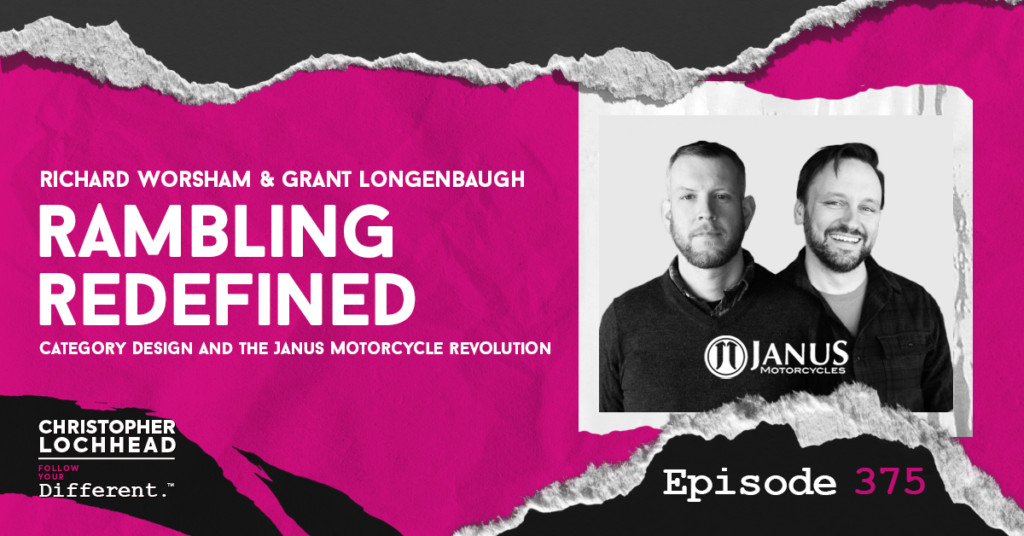
Podcast: Play in new window | Download (Duration: 1:21:51 — 56.2MB) | Embed
Subscribe: Apple Podcasts | Spotify | Pandora | RSS | More
On this episode of Chistopher Lochhead: Follow Your Different, we talk with Richard Worsham and Grant Longenbaugh, the President and CMO of Janus Motorcycles. They discuss Janus’s unique approach to motorcycle design, emphasizing craftsmanship, simplicity, and a distinctive riding experience called “rambling.”
Richard and Grant share their journey from customizing mopeds to creating a new category of lightweight, custom motorcycles. They highlight their rejection of the industry’s focus on speed and technology, instead prioritizing the joy of riding and community engagement.
The episode underscores Janus’s success in redefining the motorcycle experience through authenticity and innovative category design.
You’re listening to Christopher Lochhead: Follow Your Different. We are the real dialogue podcast for people with a different mind. So get your mind in a different place, and hey ho, let’s go.
What is Janus Motorcycles?
Janus Motorcycles stands out in an industry that typically prioritizes speed and technological advancements. While the mainstream motorcycle market grows at a modest rate of about 2% annually, Janus has achieved remarkable growth, boasting a 50% increase over the previous year. This success is attributed to their commitment to craftsmanship and a unique riding experience that emphasizes a slower, more meditative journey.
The early days of Janus saw Richard and his co-founder, Devin, customizing mopeds and eventually deciding to create a motorcycle that reflected their vision. They started with a 50cc model, drawing inspiration from their experiences with mopeds. Community and collaboration played a crucial role in their journey, as they relied on local expertise and craftsmanship to bring their vision to life.
Richard Worsham & Grant Longenbaugh and how they got into Janus Motorcycles
Richard Worsham’s journey began on the East Coast and eventually led him to Goshen, Indiana, where Janus is based. His time at Notre Dame and the region’s rich history in craftsmanship, particularly in the RV industry, laid the foundation for Janus. Leveraging local manufacturing resources, including partnerships with Amish craftsmen known for their exceptional quality, Richard’s passion for motorcycles was ignited during his college years. This passion ultimately led to the creation of Janus Motorcycles.
Grant Longenbaugh, with a background in marketing and creative work, became involved with Janus out of passion and curiosity. He and his colleague, Jordan, helped launch the 250cc line through a successful Kickstarter campaign. This campaign not only provided the necessary funding for EPA testing but also marked a turning point for Janus, allowing them to scale their operations.
On Rejecting Industry Norms
Janus Motorcycles takes a starkly different approach compared to the broader motorcycle industry, which has been focused on technological advancements and performance enhancements for decades. Richard and Grant articulate their philosophy of rejecting this “features push” mentality, instead prioritizing beauty, simplicity, and a genuine connection to the riding experience.
Richard draws parallels between motorcycles and classic cars, noting that vehicles like the old MGs provide a raw, engaging experience that modern vehicles often lack. He argues that while technological advancements like anti-lock brakes and rider aids are beneficial, they can also dilute the authentic experience of riding. The focus should be on the joy of the ride itself, rather than on features that might be more appropriate for household appliances.
To hear more from Richard Worsham & Grant Longenbaugh on their experience with Janus Motorcycles and the category of motorcycles and riding experience, download and listen to this episode.
Bio
Richard Worsham and Grant Longenbaugh are the President and CMO of Janus Motorcycles, a motorcycle manufacturer company based in Goshen, Indiana. Richard Worsham, an artist and engineer with a passion for vintage and handcrafted designs, envisioned a brand that blends classic aesthetics with modern engineering. He focuses on creating lightweight, small-displacement motorcycles that offer an authentic riding experience, drawing inspiration from 20th-century motorcycling heritage.
Grant Longenbaugh, with a background in engineering and business, complements Worsham’s vision by overseeing operations, logistics, and business strategy. Together, they turned their shared enthusiasm for craftsmanship, American manufacturing, and motorcycling into a successful enterprise. Their motorcycles are celebrated for their unique, hand-built quality, simple yet effective engineering, and distinct retro-inspired design.
Under their leadership, Janus Motorcycles has grown a dedicated following of riders who appreciate the company’s philosophy of embracing the joy of riding over speed, as well as its commitment to sustainable, small-scale production. The company remains proudly American-made, with every motorcycle built by hand in their Indiana workshop.
Links
Learn more about Janus Motorcycles!
Janus’ Website | Janus’ LinkedIn | Instagram | YouTube | Facebook
Richard’s LinkedIn | Grant’s LinkedIn
We hope you enjoyed this episode of Christopher Lochhead: Follow Your Different™! Christopher loves hearing from his listeners. Feel free to email him, connect on Facebook, X (formerly Twitter), Instagram, and subscribe on Apple Podcast / Spotify!
374 From Vodka to Bongs: John Spagnola on Building Legendary Brands & Creating New Categories
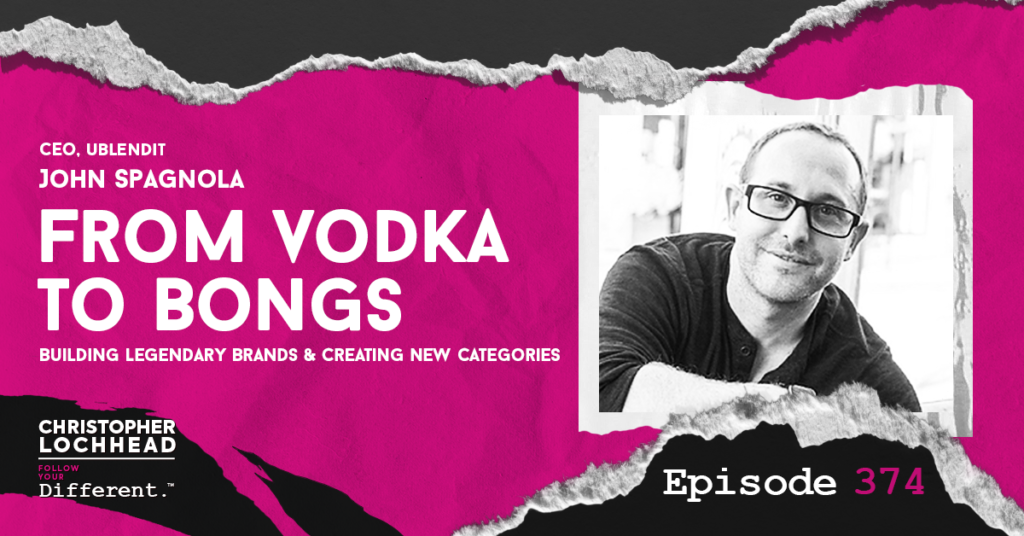
Podcast: Play in new window | Download (Duration: 1:06:47 — 45.9MB) | Embed
Subscribe: Apple Podcasts | Spotify | Pandora | RSS | More
On this episode of Christopher Lochhead: Follow Your Different, we have a conversation with John Spagnola, CEO of Ublendit, about innovation and category creation in the spirits industry.
John shares his journey, emphasizing the strategic advantage of creating new categories rather than competing in existing markets. He discusses the success of Hideout Vodka and introduces a new agave spirit, the “77,” designed for health-conscious consumers.
The episode also explores the impact of celebrity endorsements and meaningful partnerships, such as Hideout Vodka’s initiative with the National Parks.
You’re listening to Christopher Lochhead: Follow Your Different. We are the real dialogue podcast for people with a different mind. So get your mind in a different place, and hey ho, let’s go.
John Spagnola on the Challenge of Competing in Established Markets
John starts off the conversation by reflecting on the challenges faced by smaller brands in a market controlled by a few large companies like Diageo and Constellation Brands. These giants can easily undercut smaller brands on price, making it difficult for them to compete. John emphasizes that merely trying to fit into the existing market is a trap that many fall into.
Instead of competing within established markets, John advocates for creating new categories. This approach not only differentiates products but also attracts attention from larger companies, who view category creators as innovative rather than as threats. He cites the success of brands like Screwball Whiskey and 21 Seed, which created unique categories and achieved significant valuations.
Hideout Vodka and MGM Partnership
John shares the story of Hideout Vodka, which gained traction by securing a partnership with MGM properties in Las Vegas. This partnership allowed Hideout Vodka to become the vodka of choice in several MGM hotels, marking a significant win for a smaller player in the industry. However, as the brand began to grow, John realized they were falling into the trap of merely trying to fit into the existing market.
Recognizing the need for innovation, John and his team brainstormed a new product idea involving Cheech and Chong, the iconic duo known for their association with cannabis culture. They conceptualized a vodka product called “The Judge’s Water,” which cleverly ties into a memorable scene from Cheech and Chong’s movie “Up in Smoke.” The product not only serves as vodka but also converts into a bong, appealing to their fan base in a novel way. This product sold over 5,000 units quickly, showcasing the power of category creation.
John Spagnola on Leveraging Celebrity Partnerships
John believes that aligning with well-known figures can turbocharge category creation and drive consumer interest. He shares his excitement about developing an apple pie whiskey, initially inspired by Martha Stewart, but now considering other celebrity partnerships that could elevate the brand even further.
John then discusses the potential for high acquisition multiples in the spirits industry, noting that companies can achieve impressive valuations, especially when they have a unique product and a celebrity endorsement. He highlights the average revenue multiples in the spirits sector, which can reach as high as 21x for celebrity-backed brands, making it an attractive space for innovation and investment.
To hear more from John Spagnola and his ventures in Category Creation, download and listen to this episode.
If you want to hear about our previous discussion about the Custom Spirits Category, check out this previous episode at FYD 212.
Bio
John Spagnola is the CEO of Ublendit, LLC. Ublendit is a pioneer in the custom spirts category. They are the first to create custom spirits for hotels, bars, nightclubs, restaurants and special events.
John is also Managing Partner at Venture Santa Cruz, where they identify new markets to make a difference in and disrupt them.
He’s based in Santa Cruz, CA.
Links
Follow John Spagnola!
We hope you enjoyed this episode of Christopher Lochhead: Follow Your Different™! Christopher loves hearing from his listeners. Feel free to email him, connect on Facebook, X (formerly Twitter), Instagram, and subscribe on Apple Podcast / Spotify!
373 Surviving and Thriving: Dr. Judy Ho on How to Heal and Build Stronger Relationships

Podcast: Play in new window | Download (Duration: 59:03 — 40.5MB) | Embed
Subscribe: Apple Podcasts | Spotify | Pandora | RSS | More
On this episode of Christopher Lochhead: Follow Your Different, we have an insightful conversation with Dr. Judy Ho, a renowned clinical and forensic neuropsychologist, to explore attachment theory and its impact on personal and professional relationships.
Dr. Judy Ho explains how early caregiver relationships shape our emotional responses and interactions throughout life. They also discuss the nature versus nurture debate, cultural influences on empathy, and the potential for healing attachment wounds at any age.
This episode also delves into managing negative self-talk and understanding attachment styles, offering practical strategies for fostering healthier relationships and personal growth.
You’re listening to Christopher Lochhead: Follow Your Different. We are the real dialogue podcast for people with a different mind. So get your mind in a different place, and hey ho, let’s go.
Dr. Judy Ho on Attachment Theory
Attachment theory, as explained by Dr. Judy Ho, is a psychological model that describes the dynamics of long-term interpersonal relationships between humans. It focuses on the bond formed with primary caregivers during early childhood, which lays the foundation for how individuals perceive themselves and navigate challenges in life.
This bond is crucial because, as infants, we are entirely dependent on adults for survival. The lessons learned during this formative period are deeply ingrained, influencing our behavior and emotional responses well into adulthood.
Christopher Lochhead brings up the nature versus nurture debate, questioning whether core human qualities like love and empathy are innate or learned. Dr. Judy Ho explains that these traits are a combination of both biological drives and environmental influences. While there may be an innate tendency to care for those we are related to, much of how we express love and empathy is shaped by our environment and the behaviors modeled by others.
Cultural Influences on Empathy and Generosity
Christopher shares a personal story about an encounter with an immigrant in distress, highlighting cultural differences in perceptions of generosity and empathy. Dr. Ho notes that culture significantly shapes our values and behaviors.
In individualistic cultures like the United States, personal independence is often prioritized, whereas collectivist cultures emphasize community support and shared resources. This cultural context can profoundly influence how individuals respond to acts of kindness and generosity.
Dr. Judy Ho on Healing at Any Age
The conversation shifts to the possibility of healing attachment wounds, even for those who have experienced difficult childhoods. Dr. Ho reassures listeners that healing is possible at any age, regardless of whether the original caregivers are available for discussion. The key is to develop a secure attachment to oneself, which involves recognizing and addressing the patterns formed due to past experiences.
Christopher reflects on the concept of “re-parenting” oneself, a process he learned about in his early twenties. Dr. Ho explains that this involves revisiting past experiences and providing oneself with the nurturing and support that may have been lacking during childhood. It is essential to understand that many individuals carry the misconception that they are to blame for their caregivers’ shortcomings, leading to negative self-talk and a distorted self-image.
To hear more from Dr. Judy Ho & her thoughts on self-healing and building healthy relationships, download and listen to this episode.
Bio
Dr. Judy Ho is a triple board-certified clinical and forensic neuropsychologist, television and media personality, and tenured associate professor at Pepperdine University.
She specializes in evidence-based therapies for mental health and has published extensively on various psychological topics.
Dr. Ho is also the author of Stop Self-Sabotage, focusing on personal growth and overcoming self-defeating behaviors. In addition to her academic work, she is a frequent guest expert on TV shows and podcasts, offering insights on mental health, relationships, and wellness.
Links
Follow Dr. Judy Ho!
Website | LinkedIn | X (formerly Twitter)
We hope you enjoyed this episode of Christopher Lochhead: Follow Your Different™! Christopher loves hearing from his listeners. Feel free to email him, connect on Facebook, X (formerly Twitter), Instagram, and subscribe on Apple Podcast / Spotify!
372 From Homeless to Millionaire: Grace Vandecruze and The Power of Believing Beyond Your Limits
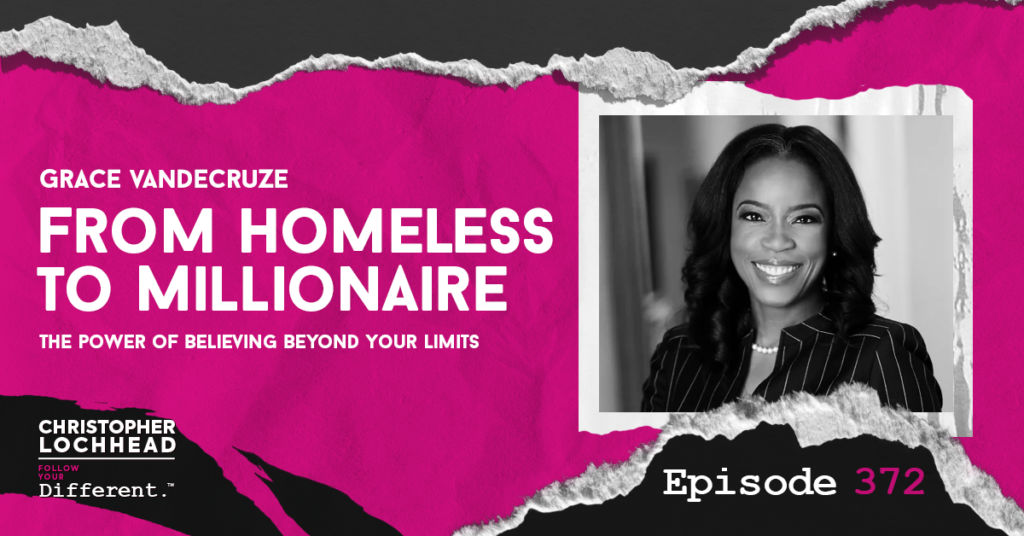
Podcast: Play in new window | Download (Duration: 58:51 — 40.4MB) | Embed
Subscribe: Apple Podcasts | Spotify | Pandora | RSS | More
On this episode of Christopher Lochhead: Follow Your Different, our guest Grace Vandecruze treats us to an extraordinary story of resilience, determination, and financial empowerment.
Grace shares her remarkable journey from a childhood marked by poverty and homelessness to becoming a successful entrepreneur and financial advisor.
You’re listening to Christopher Lochhead: Follow Your Different. We are the real dialogue podcast for people with a different mind. So get your mind in a different place, and hey ho, let’s go.
Grace Vandecruze’s Early Life and Influences
Grace’s story begins in Guyana, where she was raised by her grandmother. Her grandmother’s unwavering belief in her potential played a crucial role in shaping Grace’s mindset. Despite limited resources, her grandmother’s love and generosity instilled in her the philosophy of “believe beyond your limits.”
Grace’s family immigrated to the United States when she was 14, seeking better opportunities. They faced numerous challenges, including homelessness. Despite these hardships, her determination to succeed never wavered. She viewed education as the key to breaking the cycle of poverty and worked tirelessly to excel academically.
Financial Empowerment and Education
The COVID-19 pandemic prompted Grace to shift her focus toward financial empowerment. She had been educating community groups about financial literacy, introducing concepts like investing and personal finance. In addition, the tragic events surrounding George Floyd’s death further motivated her to publish her book, “Homeless Millionaire: Six Pillars to Uplift to Financial Abundance,” to empower others during a time of crisis.
Grace’s book is designed to be accessible and practical, filled with tools and resources to help readers navigate their financial journeys. She likens the process to climbing a mountain, where she supports readers every step of the way.
Grace Vandecruze on Embracing Identity and Overcoming Stereotypes
Grace reflects on her identity as a woman, an immigrant, and a person of color, asserting that these aspects of her life are not disadvantages but rather unique strengths that set her apart. She believes that everyone has the potential to transcend stereotypes and limitations through mindset and determination.
Grace likens life to mountain climbing, where reaching a peak is just a momentary celebration before facing the challenges of the descent. She emphasizes the importance of continuous growth and the pursuit of new challenges.
To hear more from Grace Vandecruze & her amazing journey, download and listen to this episode.
Bio
Grace Vandecruze is a financial advisor, CPA, and Founder of Grace Global Capital, LLC, with over 20 years of Wall Street experience. She has advised on transactions exceeding $5 billion and holds an MBA from The Wharton School.
Grace’s life was transformed after a fire left her family homeless, fueling her passion for financial wellness. An accomplished mountaineer and sailor, she inspires others through her resilience.
Grace has been recognized by Business Insurance and Directors & Boards, and frequently contributes to financial media as a speaker and thought leader.
Links
Find out more about Grace Vandecruze!
LinkedIn | X (formerly Twitter) | Homeless to Millionaire
We hope you enjoyed this episode of Christopher Lochhead: Follow Your Different™! Christopher loves hearing from his listeners. Feel free to email him, connect on Facebook, X (formerly Twitter), Instagram, and subscribe on Apple Podcast / Spotify!

